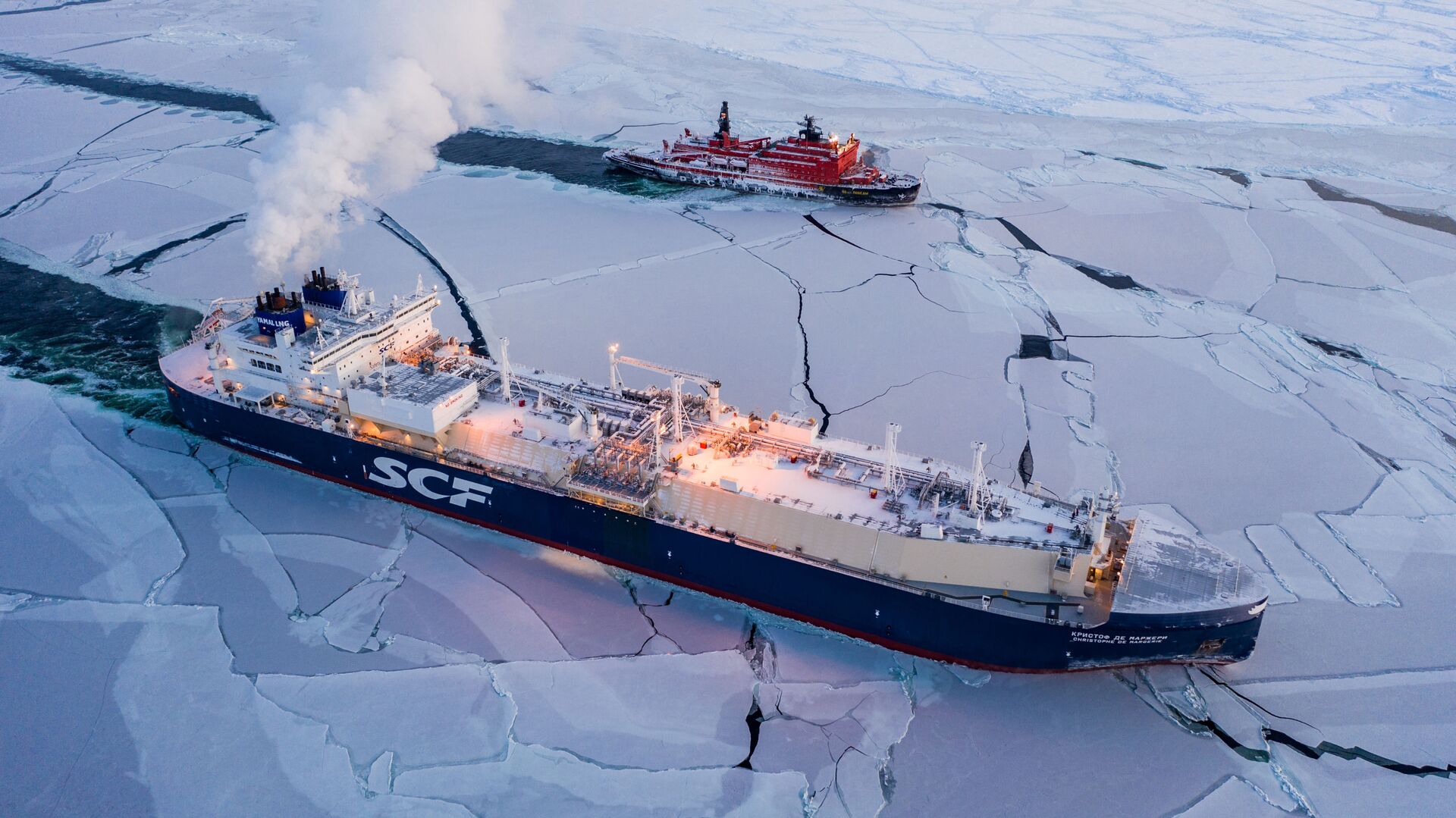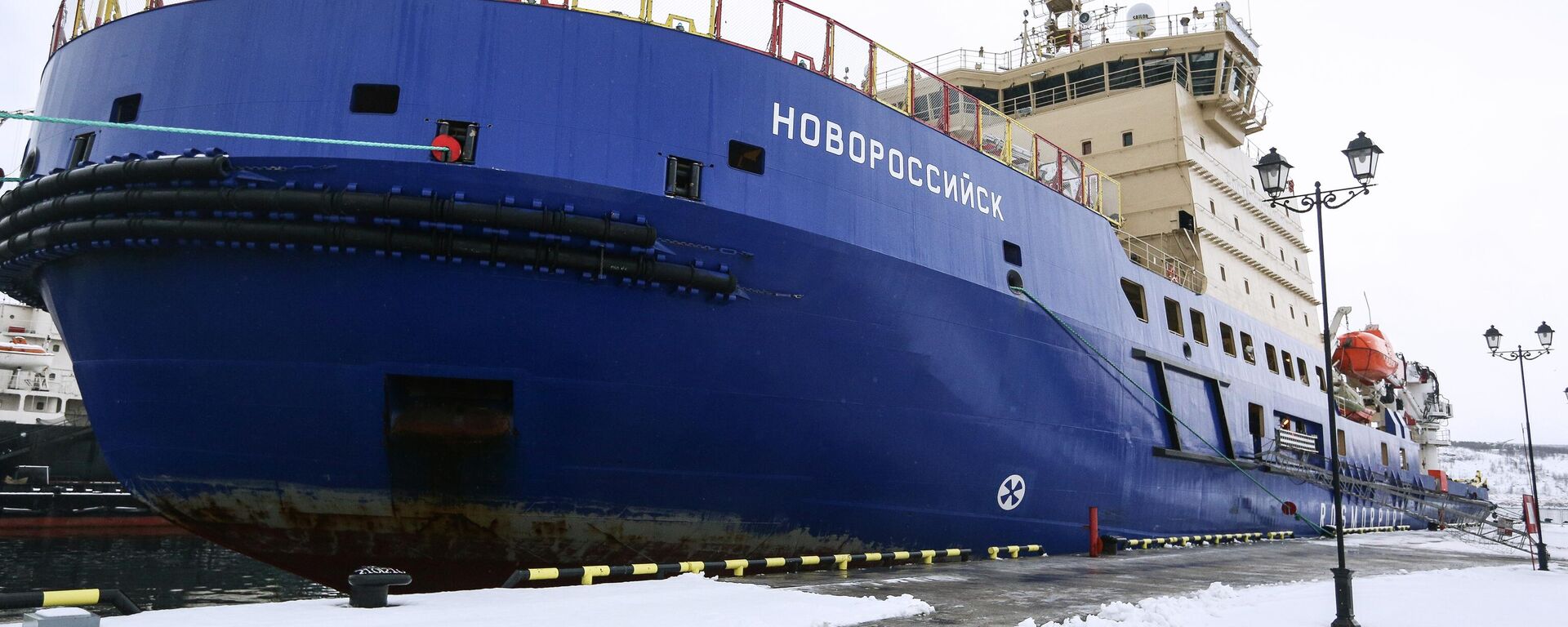https://sputniknews.in/20240429/indo-russia-cooperation-in-arctic-to-push-forward-northern-sea-route-7245389.html
Indo-Russian Cooperation in Arctic to Push Forward Northern Sea Route
Indo-Russian Cooperation in Arctic to Push Forward Northern Sea Route
Sputnik India
Deepening India-Russia cooperation in the Arctic could help in removing the obstacles to the ambitious NSR which is expected to become fully operational for year-round activity in the next few years.
2024-04-29T20:04+0530
2024-04-29T20:04+0530
2024-04-29T21:05+0530
sputnik opinion
india
russia
new delhi
indian navy
moscow
delhi
northern sea route (nsr)
sea trade
trade corridor
https://cdn1.img.sputniknews.in/img/07e7/03/1b/1312289_0:197:3075:1926_1920x0_80_0_0_401c8a642929cf8d063268aded73a843.jpg
Deepening India-Russia cooperation in the Arctic could help in removing the obstacles to the ambitious Northern Sea Route (NSR) which is expected to become fully operational for year-round activity in the next few years, an Indian maritime expert has said.The remarks of Indian Navy veteran Commodore (retired) Seshadri Vasan come in the wake of discussions between New Delhi and Moscow over launching a project in the Arctic Region that could be as large as the International Space Station (ISS) scientifically.Against this background, Vasan stressed that India and Russia have enormous amounts of experience in working together. For instance, it was Russia that helped India discover crude in Mumbai High Field, an offshore oil field located 109 miles from Maharashtra's western coast.How India's Scientific Temperament Could Help in Removing Barriers to NSR?It is rightly said this is comparable to the kind of challenges there are in building an International Space Station and getting all the data from the Space above, he added.According to Vasan, the waters in the Arctic pose considerable challenges in terms of understanding the entire contours of the bottom - the way, tide, wind, and topography, so all this is of great relevance to both countries because it is the oceans that hold the future for deep sea minerals, trade routes and for other things where there is a diminishing scale of return on investments on the Earth's surface.Expanding Scope of Maritime TradeVasan highlighted that as the impact of global warming on the oceans rises, more and more days will be available in the Arctic Sea for passage, leading to the cutting down of distances on many sea routes. This will cater to the expanding scope of maritime trade, not only in the traditional warm waters of the Indian Ocean Region (IOR) but also in the cold waters of the Arctic.He pointed out that both India and Russia are greatly interested in finding out what these oceans hold, especially with greater days now available for exploration, trade routes, and connectivity.
https://sputniknews.in/20240301/india-could-count-on-russian-icebreakers-to-ensure-year-round-trade-along-northern-sea-route-6710745.html
india
russia
new delhi
moscow
delhi
the arctic
indian ocean
Sputnik India
feedback.hindi@sputniknews.com
+74956456601
MIA „Rossiya Segodnya“
2024
Pawan Atri
https://cdn1.img.sputniknews.in/img/07e6/0c/13/139630_147:0:831:684_100x100_80_0_0_8fa2b25903e7787fe6a2698552c167df.png
Pawan Atri
https://cdn1.img.sputniknews.in/img/07e6/0c/13/139630_147:0:831:684_100x100_80_0_0_8fa2b25903e7787fe6a2698552c167df.png
News
en_IN
Sputnik India
feedback.hindi@sputniknews.com
+74956456601
MIA „Rossiya Segodnya“
Sputnik India
feedback.hindi@sputniknews.com
+74956456601
MIA „Rossiya Segodnya“
Pawan Atri
https://cdn1.img.sputniknews.in/img/07e6/0c/13/139630_147:0:831:684_100x100_80_0_0_8fa2b25903e7787fe6a2698552c167df.png
northern sea route, nsr, northern sea route india, northern sea route indian ships, northern sea route putin, northern sea route vladimir putin, northern sea route russian president, northern sea route chennai-vladivostok maritime corridor, chennai-vladivostok maritime corridor northern sea route, putin state of the nation address, vladimir putin state of the nation address, putin address to the federal assembly, vladimir putin address to the federal assembly, eurasian security framework, new eurasian security framework, eurasian security framework putin, eurasian security framework vladimir putin, russia, russian president putin, vladimir putin, putin, ukraine-russia war, special military operation, russia-ukraine conflict, russia-ukraine war, nato eurasian security framework, putin news, putin latest,
northern sea route, nsr, northern sea route india, northern sea route indian ships, northern sea route putin, northern sea route vladimir putin, northern sea route russian president, northern sea route chennai-vladivostok maritime corridor, chennai-vladivostok maritime corridor northern sea route, putin state of the nation address, vladimir putin state of the nation address, putin address to the federal assembly, vladimir putin address to the federal assembly, eurasian security framework, new eurasian security framework, eurasian security framework putin, eurasian security framework vladimir putin, russia, russian president putin, vladimir putin, putin, ukraine-russia war, special military operation, russia-ukraine conflict, russia-ukraine war, nato eurasian security framework, putin news, putin latest,
Indo-Russian Cooperation in Arctic to Push Forward Northern Sea Route
20:04 29.04.2024 (Updated: 21:05 29.04.2024) Beyond their long-standing military partnership, India and Russia are now venturing into newer areas, especially ocean exploration together to unravel the hidden secrets of the deep seas. Sputnik India analyzes what this cooperation means for the Northern Sea Route and beyond.
Deepening India-Russia cooperation in the Arctic could help in removing the obstacles to the ambitious Northern Sea Route (NSR) which is expected to become fully operational for year-round activity in the next few years, an Indian maritime expert has said.
The remarks of Indian Navy veteran Commodore (retired)
Seshadri Vasan come in the wake of discussions between New Delhi and Moscow
over launching a project in the Arctic Region that could be as large as the
International Space Station (ISS) scientifically.
"Our scientists are working with the support of a unique vessel — an ice-resistant platform, which has the most modern equipment and technology for scientific work in high latitudes. We invited Indian colleagues to join research, and they were very interested in it," Alexander Makarov, Director of the Russian Arctic and Antarctic Research Institute (AARI) said on Sunday.
Against this background, Vasan stressed that India and Russia have enormous amounts of experience in working together. For instance, it was Russia that helped India
discover crude in Mumbai High Field, an offshore oil field located 109 miles from Maharashtra's western coast.
How India's Scientific Temperament Could Help in Removing Barriers to NSR?
"This kind of scientific cooperation between India and Russia will lead to a better understanding of the route in the Arctic. Additionally, India could contribute to removing obstacles in the Northern Sea Route through its scientific temperament. For example, it can help Russia in mapping the NSR by using various survey vessels that are equipped to carry out scientific studies of deep-sea waters," the strategic affairs pundit told Sputnik India on Monday.
It is rightly said this is comparable to the kind of challenges there are in building an International Space Station and getting all the data from the Space above, he added.
According to Vasan, the waters in the Arctic pose considerable challenges in terms of understanding the entire contours of the bottom - the way, tide, wind, and topography, so all this is of great relevance to both countries because it is the oceans that hold the future for deep sea minerals, trade routes and for other things where there is a
diminishing scale of return on investments on the Earth's surface.
"I am specifically referring to the rare-earth materials that are becoming less and less and the cost of extracting them is getting higher and higher. The Arctic, in particular, has been unexplored to a large extent, except for some fishing activities that are going on and the trade routes like the North Sea Route," he explained.
Expanding Scope of Maritime Trade
Vasan highlighted that as the impact of global warming on the oceans rises, more and more days will be available in the Arctic Sea for passage, leading to the
cutting down of distances on many sea routes. This will cater to the expanding scope of maritime trade, not only in the traditional warm waters of the
Indian Ocean Region (IOR) but also in the cold waters of the Arctic.
He pointed out that both India and Russia are greatly interested in finding out what these oceans hold, especially with greater days now available for exploration, trade routes, and connectivity.
"Moreover, the fact that New Delhi and Moscow have found it appropriate to deal with the scientific community in India for understanding the Arctic Ocean better augurs well for India's own underwater domain awareness. This underwater domain awareness is a new science that emphasizes that unless one tries to understand the oceans in their entirety one will not be able to manage climate change," he concluded.



